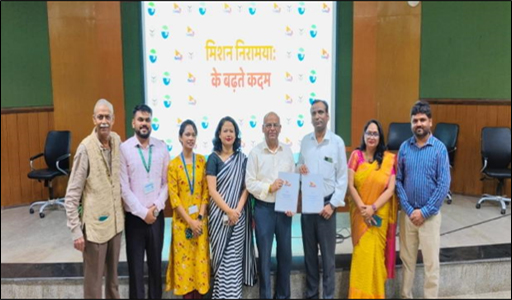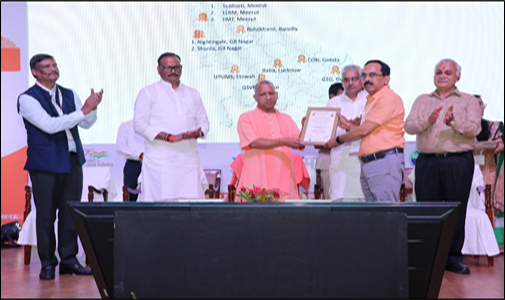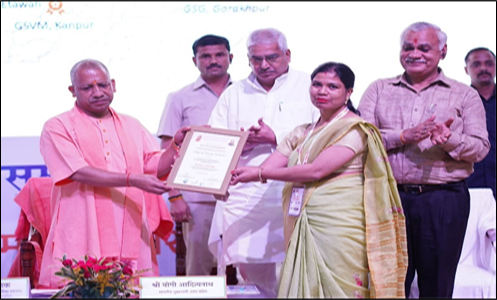Quality Initiative (Mentor Mentee Program)
Nursing cadre is the backbone of the health care delivery system and Nursing education play a big role in producing the quality nurses. Quality needs improvement across the country, Uttar Pradesh (UP) is no exception.
Despite the fact that Indian nursing Council (INC) introduced competency-based curriculum, the awareness and competence of qualified nurses applying for jobs needed attention. Uttar Pradesh State Nursing Council (UPSNC) housed in Uttar Pradesh State Medical faculty (UPSMF) and governed through medical education department took up the challenge. Regular huddles at UPSMF made the stakeholders realize that improving quality is an area which needed technical expertise. Jhpiego had the legacy of working in the area of improving quality of nursing education since 2009, mainly through government of India’s nursing education performance standards (NEPS), creation of skills labs, and working with faculty on pedagogy and teaching learning processes. Uttar Pradesh Technical Support Unit (UPTSU) is developing an ecosystem around digital solutions to create an enabling environment in the state. Samagara was entrusted to institutionalize the process in UPSNC. All the stakeholders came together under guidance of decision makers of UPSMF and execution of the intervention across the state through secretary UPSMF.
Keeping in mind the sustainability aspects and to cover more than 500 institutes, Jhpiego suggested to create human capital in the state to take forward the processes. It was also suggested that institutional backup of the human capital was a must to institutionalize the process. The deliberation on quality clearly identified two distinct fire-walled mechanisms, quality improvement and quality assurance.
Decision was taken that an open invitation to institutes be given by UPSNC to invite voluntary participation by institutes for quality improvement. Such participating and selected institutes will be given necessary technical support to come up to a level of achieving 85% of nursing education performance standards (NEPS). These Institutions in turn would agree to take up the role of supporting other nursing institutes who wish to engage with them to improve their quality of education. During this process a few selected faculty from voluntary institutions were to be capacitated for different roles which are necessary for quality improvement like setting up skills lab with essential protocol and working with faculty on pedagogy and teaching learning processes etc. This whole process will be called mentorship program. UPSNC will engage with the qualified institutes willing to take forward the process through a Memorandum of Association (MoA). Similarly, the low-performing institutes who wish to improve their quality would get into a Memorandum of Understanding (MoU) with the qualified institutes hereby called mentor institutes. The low-performing institutes would be called mentee institutes.
It was also realized that there could be institutes who would want to improve by themselves and therefore the process and orientation on nursing education performance standards (NEPS) be provided to all through virtual sessions.
While attempting the process of developing mentor institutes, it was realized that appropriate changes including addition of community practices be included in light of revised competency-based nursing curriculum developed in 2020. The same was done by Jhpiego and vetted by group of experts from the state and across the country. At present the UP-NEPS has 75 standards under 6 areas; i) college infrastructure and training materials, ii) college management, iii) classroom and practical instruction iv) preparation for clinical and community instruction and practice v) clinical areas where student nurses undertake clinical experience, and vi) community areas where student nurses undertake community experience.
The quality assurance processes have been conceived as 3rd party rating by external agency along with, intra institute mechanism of internal peer assessments and in-state mechanism for validations through assessors commissioned by UPSNC.
Updates
- A total of 29 mentor institutes in place to take forward various processes.
- Phase one- 12 mentor institutes, Phase two- 8 mentor institutes and Phase three -9 mentor institutes.
- 95 institutions collaborated through voluntary business model as mentees with Phase 1 and 2 Mentors.
- 20 (30%) out of 95 mentee institutes have completed the journey (scored >=75% score) of Performance standard scores.
- 25 Mentor faculty have been certified.
- Capacity Building Training of Mentor Institutes: In Phase -1 and 2 Capacity building training initiative, Mentors Training (Pragati) successfully achieved 100% coverage of the targeted participants. For Nursing Education Performance Standards covered 89% of the intended audience. Similarly, Teaching-Learning Processes training also covered 89% of the target group. Clinical Practice Processes achieved 84% coverage, while Community Practice Processes, reached 91% of the targeted participants. Additionally, College Management Training was completed by 65% of the intended participants by UPSMF with technical support by Jhpiego.








